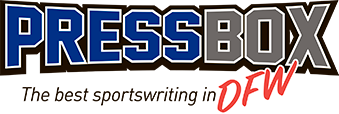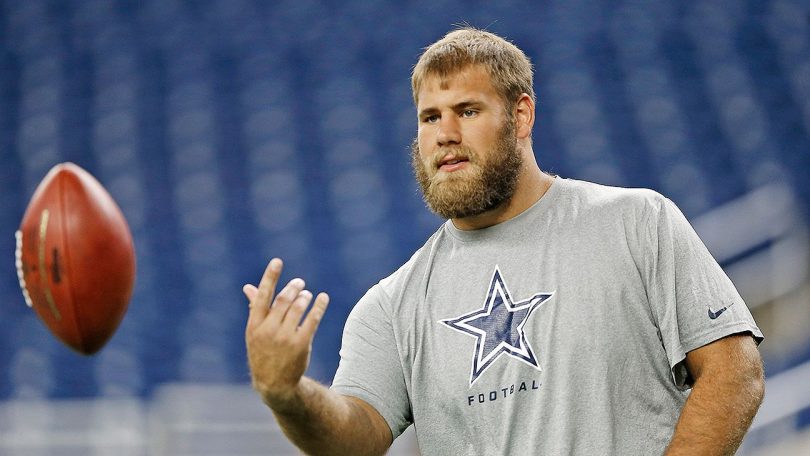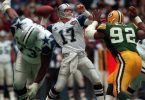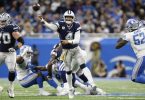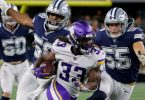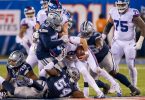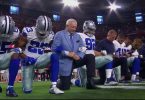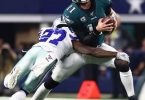FRISCO — The most important addition to the Dallas Cowboys offense isn’t Jason Witten or Randall Cobb. This team’s Super Bowl hopes, in my humble opinion, rest on the quarterback of the offensive line, center Travis Frederick.
His demise last August due to an auto-immune disease called Guillain-Barre helped throw the season into an early tailspin that resulted in the firing of offensive line coach Paul Alexander. I don’t know if Frederick is the best offensive lineman on the team, but I believe he’s the most important member of that unit. And slowly and somewhat agonizingly, he’s making his way back to the field. On Wednesday, he agreed to an exclusive interview with the Doomsday Podcast, which I do with former ESPN reporter Ed Werder. This transcription has been condensed for clarity because Ed gets pretty long-winded:
Mosley: How good does this feel? You’ve had to go through a lot of different steps, so where is this in the whole scheme of things?
Frederick: This is an interesting part of it because it’s been this huge process coming back, but it’s not unlike the process of a normal offseason in that you go from a period of inactivity to starting with some lifting, then you go to running and then you go to OTAs and minicamp and then to training camp. It’s real easy to rack up some rust from some time away, but it quickly gets back to you when you get a chance to go out and do some of those individual drills and do some technique work.
Werder: Where do you feel like you are physically in terms of making a full recovery?
Frederick: You know it’s really hard to say percentage-wise just because you don’t really talk about baseline numbers in nerve conductions, so I feel really good about where I am right now, but I won’t know anything about my ability to play football at a high level until we put on pads and play football at a high level. You know OTAs and minicamp are significantly different because you aren’t wearing any pads. You know we are moving quickly, but it’s just not the same.
Mosley: So what are you targeting? You sort of need to see yourself in the preseason? Preseason might be more important to you than ever. Is that kind of when you know you will be all the way back?
Frederick: I think for me it’s just the process of training camp. It used to be about getting into shape, and that’s not necessarily the case anymore. I think now it’s really about getting back into playing form and having all of your techniques perfected by the beginning of the season so you are in mid-season form at the beginning of the season. Throughout that course of training camp you are working on all the blocks in the schemes and just working through those with pads on at full speed, those are the things you need to do.
Werder: You had never missed a game until this happened. You stayed fully engaged to the best of your ability. I used to see you down there with a headset on working with the offensive linemen. What was the benefit to you and to the team of you contributing in that way?
Frederick: Personally and selfishly there was a lot of benefit for me. The fact that I could stay engaged and still feel like I was a part of the team was great. When you are injured you kind of feel separated. So you just feel a little disconnect there. Staying involved helped me feel closer to my team and I think that I was able to offer a little bit in return. I was able to offer some expertise and experience to some guys who hadn’t had as many starts. From a bigger picture standpoint getting to see the game sort of through a coach’s eyes through a different vantage point was helpful for me. When you are in the game you’re focused on your particular technique or what you need to do against that guy, but when you look at it from a bigger picture it helps you see the game in a different way.
Werder: It was an unusual year for the O-line because not only were you missing Tyron Smith, Zach Martin missed some time. In the middle of the season with Paul Alexander getting fired. Hudson Houck came in and helped Marc Colombo with the transition. Now Marc is going to do this on his own. What’s your take on him as an offensive line coach, with him being a former player?
Frederick: I really enjoy the expertise that Coach Colombo brings in having been there and been there recently it really gives you a good feeling for what’s going on in the game currently. You get a different side of coaching. I think at this point I have had a little bit of everything. You’re always looking for different tools for your toolbox. You’re looking for different viewpoints on things you go from a guy like [Bill] Callahan to a guy like [Frank] Pollack and a guy who is fresher out of the league like Colombo.
Mosley: What’s the biggest difference with Kellen Moore as OC that you have been able to see?
Frederick: I think there’s several things that are different, but there are a lot of things that are the same. There is a sort of freshness about how he looks at the game a little bit differently and I appreciate how he looks at the game because I look at it similarly. Just the way he organizes things and the way the plays are called and some of the different movements he has going on and a couple of the schemes. It’s just fresh and it’s new, but still holds onto the convictions we believe in as the Dallas Cowboys, so I think it’s a good meld and I’m excited to see him.
Werder: A year into recovery from Guillain-Barre syndrome, did you ever doubt if you could make a full comeback?
Frederick: I don’t doubt it. I would say at this point I can’t confirm it. I think that is the best way to put it. I just try to be really realistic about it and know that it’s a really serious thing. My body has been through a lot and I believe that things have progressed in a positive way and perhaps even better than I would have hoped four months ago. But I can’t tell you right now that I am 100% and the best I will ever be. If you ask me during training camp, maybe I can tell you a little more. I’m just excited I get a chance to approach training camp from a normal standpoint.
Werder: So that people understand what you have been through what was your physical state at your lowest point?
Frederick: There were times for me where it’s a 200-yard walk to the lunch room from here? There were times that I didn’t eat lunch because it was too hard for me to walk from the locker room to the lunch room. My muscles couldn’t stabilize when I was walking, so it was really difficult to walk, and I would get really tired very quickly. In the weight room, everything was a struggle. It was pretty dark there for a minute. Luckily I never had issues with my respiratory system, and luckily I was always able to stay on my feet. I never got to the point where I couldn’t walk. Once you get to that point, you have to re-teach yourself how to walk. I got really lucky in that regard and the fact that I had such tremendous medical care here both with my training staff and our doctors, and with my neurologist.
Werder: You were fortunate that it was diagnosed when it was because most people that have that are diagnosed after the effects are respiratory after they are on a ventilator.
Frederick: It can go downhill really quickly. I think one of the best things I had going for me was I was in the best shape of my life going into training camp, so it took longer for it to take more of my strength away and things like that. Based on that timeline, another week I probably wouldn’t be walking and maybe not breathing.
